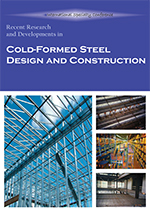Session Dates
24 Aug 2012 - 25 Aug 2012
Abstract
In this paper a design method for the compressive capacity of sandwich panels comprised of steel face sheets and foamed steel cores is derived and verified. Foamed steel, literally steel with internal voids, provides the potential to mitigate many local stability issues through increasing the effective width-to thickness of the component for the same amount of material. Winter’s classical effective width expression was generalized to the case of steel foam sandwich panels. The provided analytical expressions are verified with finite element simulations employing brick elements that explicitly model the steel face sheets and steel foam cores. The closed-form design expressions are employed to conduct parametric studies of steel foam sandwich panels with various face sheet and steel foamed core configurations. The studies show the significant strength improvements possible with steel foam sandwich panels when compared with plain steel sheet/plate.
Department(s)
Civil, Architectural and Environmental Engineering
Research Center/Lab(s)
Wei-Wen Yu Center for Cold-Formed Steel Structures
Meeting Name
21st International Specialty Conference on Cold-Formed Steel Structures
Publisher
Missouri University of Science and Technology
Document Version
Final Version
Rights
© 2012 Missouri University of Science and Technology, All rights reserved.
Document Type
Article - Conference proceedings
File Type
text
Language
English
Recommended Citation
Szyniszewski, S.; Smith, B. H.; Zeinoddini, V. M.; Hajjar, J. F.; Arwade, S. R.; and Schafer, B. W., "Towards the Design of Cold-formed Steel Foam Sandwich Columns" (2012). CCFSS Proceedings of International Specialty Conference on Cold-Formed Steel Structures (1971 - 2018). 1.
https://scholarsmine.mst.edu/isccss/21iccfss/21iccfss-session6/1
Towards the Design of Cold-formed Steel Foam Sandwich Columns
In this paper a design method for the compressive capacity of sandwich panels comprised of steel face sheets and foamed steel cores is derived and verified. Foamed steel, literally steel with internal voids, provides the potential to mitigate many local stability issues through increasing the effective width-to thickness of the component for the same amount of material. Winter’s classical effective width expression was generalized to the case of steel foam sandwich panels. The provided analytical expressions are verified with finite element simulations employing brick elements that explicitly model the steel face sheets and steel foam cores. The closed-form design expressions are employed to conduct parametric studies of steel foam sandwich panels with various face sheet and steel foamed core configurations. The studies show the significant strength improvements possible with steel foam sandwich panels when compared with plain steel sheet/plate.



